Peace
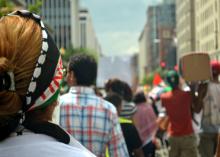
Saturday marked the third time since Israel began military operations in Gaza on July 8 that I let my voice be heard. I stood and marched alongside some 20,000 other individuals that like me have become utterly disgusted by what is unfolding in the Middle East.
A cease-fire has been struck, but as of yesterday, at least 1,800 Palestinians, most of whom are civilians, have been killed and nearly 7,000 have been wounded. Another 200,000 have been displaced in a territory whose infrastructure is now in ruins with mass power and water outages.
Despite the horrific events that have happened halfway across the world, the protest last Saturday, which took place at the White House, was a beautiful sight. Among the 20,000 protesters were Muslims, Jews, and Christians. There were blacks, whites, Arabs, Asians, and Latinos. There were women and men, both young and old, who had come from cities like Chicago, Tampa, Baltimore, and Boston. Many barriers were broken as we stood and marched in solidarity with the people of Palestine.
There were times when my heart was completely broken as I saw signs with photos of dead and mutilated bodies and others that listed the names and ages of children who had been killed by Israeli airstrikes. But in those same moments I would look across the sea of protesters draped in black, white, green, and red yelling phrases such as "Free, Free Palestine!" and "Stop the killing, stop the hate!" and I would once again become a prisoner of hope. I take refuge in the rock that is Christ Jesus. I know my God stands with those being oppressed, with those seeking justice and peace. I know my voice and prayers along with millions of others around the world will be heard.
Although I am pro-Palestine, that does not make me pro-Hamas or anti-Israel. I recognize and condemn Hamas's involvement in the failed peace talks and inability to find solutions. I also mourn equally for the loss of life on the Israeli side. However, despite the part Hamas has played in all of this I do not find Israel's actions to be justified. So I march.
THE DEEPENING CRISIS gripping Iraq is a clear and present danger to global security. The crisis is fundamentally political in nature, however, not military. It cannot be resolved through the use of force, least of all by external military action from the United States. In the past, U.S. intervention has been the problem in Iraq, not the solution. Indeed many of Iraq’s current problems can be traced to the consequences of the U.S. invasion and occupation.
The United States now has a responsibility to help the Iraqi people, having contributed so much to their current travails, but our involvement should be diplomatic and humanitarian, not military. We should work through the United Nations to exert pressure on the violent extremists who are threatening the region and to mobilize international support for political and diplomatic solutions to the conflicts.
A major center of concern today is the extremist group called the Islamic State of Iraq and Syria, now identifying as the Islamic State. This group led the military takeover of Mosul and other Iraqi cities. It is a direct offshoot of the al Qaeda forces that emerged during the armed resistance to the U.S. invasion, but is now a rival to, and even more extreme than, al Qaeda.
Prior to 2003, al Qaeda did not exist in Iraq. It was only after the U.S. invasion, which shattered the state and sparked widespread violence and insurgency, that Islamist extremist groups were able to gain a foothold in Iraq. American actions fostered staggering levels of corruption and exacerbated growing Sunni-Shia sectarian tensions.
IT’S A MAY evening on the farm. My husband’s planting tomatoes and our son needs a bedtime story, but I’m completely occupied with pictures of war. I’ve cleared the piles of laundry from the kitchen table so our friend Adam can spread out his albums. There are photos of Adam in his tidy platform tent, of brown mountains in the distance, and dozens of pictures of children grinning on the other side of razor wire.
“This is an Aardvark,” he says, pointing to a gargantuan armored vehicle as he describes the flails that detonate buried mines. “What does that do to the soil?” I ask, because this is what you wonder when you and your family have been Mennonite farmers since the Reformation. There are a few more photos before I finally get it. Adam is showing me Bagram Air Base, the U.S. military hub in Afghanistan, surrounded by minefields and littered with burned-out tanks and planes, the wreckage of war from the Soviets. No one farms here, or has, or will for a long, long time.
FOR THE PAST three seasons, Adam McDermott has come to our farm in Central Pennsylvania’s Stone Valley every Friday morning to harvest vegetables for the food bank. We always chat while we bunch beets or pick green beans, and now I wonder why we’ve never talked about his years in the Army.
“This farm has definitely been part of my therapy,” he tells me, while offering a brief sketch of his months in Iraq: taking heavy equipment down unfamiliar roads to set off hidden explosives, being promoted to sergeant, and then losing three friends when a bomb shattered their Humvee. Adam came home in 2008 with Post-Traumatic Stress Disorder (PTSD) and an alcohol addiction. “A lot of guys struggle with alcohol,” Adam says. “In the military you have camaraderie and a sense of purpose. But when you get back, there’s just this big void.”

The first thing that visitors and volunteers see at the Tent of Nations just outside of Bethlehem is a large stone on which are written the words, “We refuse to be enemies.” As Israeli settlements draw ever closer to their land and the Israeli Defense Forces destroy their orchards, the Nassar family continues to pay a heavy price in their practice of Jesus’ teaching, “Love your enemies, do good to those who hate you, bless those who curse you, pray for those who abuse you (Luke 6:27-28).”
The Nassars refuse to divide the world into friends and enemies, challenging the rest of us to do the same.
As a Christian, I was raised to be pro-Israel. Since going to the region many times, I’ve become pro-Palestinian and pro-peace, too, which has led me to explore the narratives of Palestinians as well as Israelis. I grieve the deaths in both Israel and Palestine. Every human life has extraordinary value. The loss of even one life is a loss to all of us.
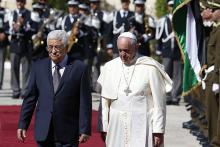
As Israel continued its ground offensive into the Gaza Strip, Pope Francis urged Israeli President Shimon Peres and Palestinian President Mahmoud Abbas to end the spiraling conflict.
The pontiff telephoned the two leaders on Friday to express “his very serious concerns” only six weeks after both me joined him at the Vatican for an historic prayer meeting.
Francis said he was concerned about the “climate of growing hostility, hatred, and suffering” that was claiming many victims, resulting in “a serious humanitarian emergency”, the Vatican said in a statement.


In July 2010 I joined with around 100 freedom fighters in Chicago, many of whom had traded the previous year of their lives to fight for comprehensive immigration reform. And we knew it was not going to happen in 2010, at least as we had imagined. Many in the room were exhausted, and defeated, and spent. The response from the campaign was to talk about the next hill to climb rather than deal with the pain and exhaustion in the room.
Doing justice is hard and exhausting work. We are compelled to action by the urgency of the suffering and pain and evil that mark life for so many in God’s world. And the work is never done. Win or lose, there is always another hill, another peak, another challenge that lies ahead. So the temptation is to keep on keeping on, and to rise to the next challenge.
For the past 20 years, I have either been a pastor or a community organizer, and for many of those years I have been both. For pastors and organizers, there is always one more email to write, one more call to make, and one more strategy to be explored. To be blunt, burnout and exhaustion are the order of the day.

THE VIOLENCE AND kidnappings in Nigeria are more than a religious conflict: They are a political manipulation of religion.
Before the 2011 Nigerian election, northern politicians (who are mostly Muslims) threatened to make the country ungovernable if Goodluck Jonathan, a Christian from the south, became president. Jonathan was vice-president for Umaru Musa Yar’Adua, a Muslim from the north, who died before completing his eight-year term. Jonathan assumed power after Yar’Adua’s death, as is allowed by the constitution. However, northern Muslims claimed that since Yar’Adua did not finish his term, they should be allowed to place someone of their own choosing in power. Jonathan’s refusal angered the north.
In response, the Muslim terrorist organization Boko Haram began intensifying its attack on Jonathan’s rule in order to discredit his presidency and his pursuit of the 2015 election. If Boko Haram succeeds in pushing Jonathan out, southern militia groups are likely to commence their own violent campaign. These terrorists are trying to manipulate people by making them think that it is a religious fight, when in reality it is about political power.
People, however, are beginning to reject the violence. In April, as the world is well aware, Boko Haram kidnapped more than 200 schoolgirls from Chibok, a community that is said to be about 90 percent Christian. The outcry of rage and pain about this incident transcended religious lines. In a May market bombing in the city of Jos, both Christians and Muslims lost their lives. After the bombings, Muslims and Christians on the streets of Jos tried to work together in finding a way through the situation. People no longer want to fight and are starting to value peacebuilding and interfaith efforts. This is a sign of hope.

ONE DAY, WHEN I was a student at Christ the King Elementary School in my hometown of Richland, Wash., the nuns gathered all the kids, two by two, and walked us outside to the parking lot. There sat a mobile van emblazoned with the logo of the Atomic Energy Commission and the words “Whole Body Scanner.”
One at a time, we were led into the van, where we laid on a white-sheathed table beneath a large, (scary), medical-looking machine. There was a whirring sound, and after a minute or two we were told to get up and make room for the next child. We weren’t told what the process was for, but it’s safe to assume that the government was interested in the effects of radiation on those of us who were “downwinders” from one of the nation’s largest nuclear complexes.
Richland was (and is) the bedroom community for the Hanford Nuclear Reservation. Hanford was built in the 1940s as part of the Manhattan Project, the massive wartime program that led to the atomic bombs dropped on Hiroshima and Nagasaki at the end of World War II. Hanford’s role was the production of plutonium for the world’s first nuclear weapon, the “test” bomb detonated in New Mexico a few weeks before Hiroshima, and for the bomb that destroyed Nagasaki three days later.
Those weapons were dropped 69 years ago, but the debate about their morality continues. It emerged again this spring when the two Missouri senators proposed renaming D.C.’s Union Station after Harry S. Truman, who authorized history’s only nuclear attack on people. One commenter in a related discussion wrote, “I have a problem with judging past cultures by today's standards. To end WWII we dropped bombs on cities filled with innocent civilians. By today's standards that would be condemned. Are you willing to say we should not have done that to end WWII?”
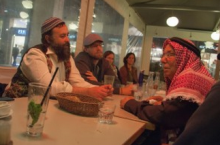
I was sitting in the airport the other day listening to yet another account of the current events unfolding in Israel and Palestine. Almost mechanically, the lips of the news anchor spilled out words like terrorists, extremist, escalating violence, detention, kidnapping, hatred, protest, etc. It was as though they were telling a story of some otherworldly reality that had virtually no human implications. It was all the stuff we are supposed to hear about the Middle East, so it successfully affirmed stereotypes, assumptions and prejudice.
"Here's how you bring light into the world," says a scruffy-bearded man in shirtsleeves and a knit cap on a Brooklyn rooftop. "First, you get up in the morning and you scream!" His mischievous grin melts into something more ethereally content as he screams. At length.
He's had plenty of practice screaming — he does it for a living.
The man is Yishai Romanoff, lead singer of the hassidic punk band Moshiach Oi and one of the half-dozen artists, activists, and culture-makers profiled in the documentary Punk Jews.
The phrase can seem like an oxymoron: The essence of punk is to challenge inherited convention, yet adherence to rich traditions of convention is the common through-line of all of Judaism's myriad flavors.
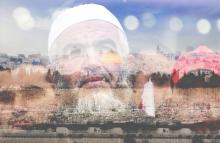
Through my work with The Global Immersion Project, I have spent a significant amount of time over the years cultivating relationships among both Israelis and Palestinians as we partner together in cultivating a narrative of reconciliation. As is often the case when we approach a people or place with the hopes of being/bringing the needed change, I have been the one most changed by my friends and colleagues who reside in the Middle East. Behind so many of the subconscious stereotypes and prejudices I had acquired earlier in my life I began to experience the richness of friendship and brotherhood among people I had previously “known” only through the latest sound bite.
Something I have learned in the classroom of real life relationships with Jews, Christians, and Muslims in the Holy Land is that our theology in the West has direct implications for the everyday lives of those in the Middle East. Often ignoring the remarkable movements of peacemaking, reconciliation, and collaboration that are sprouting like mustard seeds of hope across the Holy Land, we often choose only to amplify of the violence, discord, and disintegration of the region.

Good and Gracious God,
Yet again,
our nation grieves.
Yet again,
the life of a child
has been cut
dreadfully short.
Yet again,
we all rally to our
political centers
to cry out
for our guns,
for our rights,
for our safety,
for rational thought...

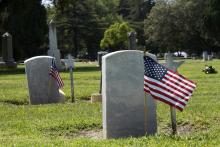
Monday was Memorial Day, full of family trips and events, lots of picnics and barbecues with friends and neighbors, and a national day off from school and work. For us it was the Northwest Little League All Star game here at Friendship Field in Washington D.C., a family tradition for many years. My wife Joy, the Commissioner, organized the game day, including a wonderful picnic on a glorious baseball day for players, parents, relatives, and many fans – with 300 hotdogs!
It was also a day to remember all the people who have died in America’s wars. For the families of those war victims and so many of their fellow veterans it was a day of remembering and mourning. In the quiet moments of listening to the national anthem while looking at the American flag, our little baseball crowd with hats off might have been thinking about the meaning of the national holiday. But right afterward it was “Play Ball.”
On Memorial Days I always end up listening to the many stories from the families who lost their most beloved ones and from the veterans whose eyes still tear up when they recall their dearest buddies lost on battlefields far away.

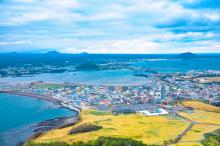
Jeju Island, South Korea — For the past two weeks, I’ve been in the Republic of Korea (ROK), as a guest of peace activists living in Gangjeong Village on ROK’s Jeju Island. Gangjeong is one of the ROK’s smallest villages, yet activists here, in their struggle against the construction of a massive naval base, have inspired people around the world.
Since 2007, activists have risked arrests, imprisonment, heavy fines, and wildly excessive use of police force to resist the desecration caused as mega-corporations like Samsung and Daelim build a base to accommodate U.S. nuclear-powered aircraft carriers and submarines for their missions throughout Asia. The base fits the regional needs of the U.S. for a maritime military outpost that would enable it to continue developing its Asia Pivot strategy, gradually building towards and in the process provoking superpower conflict with China.
“We don’t need this base,” says Bishop Kang, a Catholic prelate who vigorously supports the opposition.

This week’s “10 Best Stories” missed an important news item from Palestine — not about Pope Francis but rather a family that practices what the pope preaches.
Tent of Nations, in the Occupied West Bank, has become a sign of hope over the otherwise fruitless last decades of peace negotiations. Interlocutors have nibbled around the edges of a “two state solution” since the early 1990s with the result that Israel has been able to confiscate vast areas of Palestine. The Nassar family, represented by Daoud and his parents and siblings, have built on their 100 acres a veritable garden of peace. This luxuriant vineyard is 15 minutes from Manger Square, Bethlehem. It has been owned by the Nassars since Ottoman times, and “Tent” has illustrated, what is declared on a stone at its entrance – non-violent action in its most faithful form. More than 7,000 visitors from around the world along with children in summer camps, as well as both Israelis and Palestinians, have been buoyed by the Nassars' 100-year commitment to living peaceable amidst turmoil by expressing biblical principles of loving neighbors, forgiving those who oppress, and peaceful coexistence with their neighbors.
Early on May 19, military bulldozers destroyed 1,500 fruit trees nearly ready for harvest in the valley below the Nassar dwellings. There was no warning of the impending destruction of the trees and terraced land, left in a state of rubble with no hope of being replanted. Daoud said the family was awaiting word on an appeal submitted after military orders to stop cultivation; bulldozers came before a legal response.
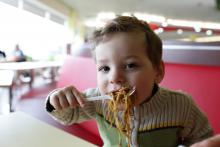
So my son comes marching into the kitchen, and says in a demanding tone, "Make me snacks now!" My first reaction is to think that this is simply unacceptable behavior, and that he needs a good talking to. But I also notice that I am quite triggered by this, and that before I do anything, I need to reflect.
So I start boiling water for some pasta (I do have enough sense to know that when he asks for a snack that what his body really needs is some healthy food and not junk). As the water boils it dawns on me why he was so rude. In a word: metabolism.
It's amazing to me how much of our spiritual and emotional problems have clear biological and physical causes. The reason he was so demanding is that his body was hungry, and so his brain went into alarm mode:
I need food NOW .
The problem is not that he is a rude kid, it's that his metabolism was flooding his brain. If I had scolded him this would have had the effect of riling up his brain even more, which was already in freakout mode (I'll leave it to a neurobiologist to explain this with big $10 words like amygdala and cerebral cortex, but the basic science here is quite solid).